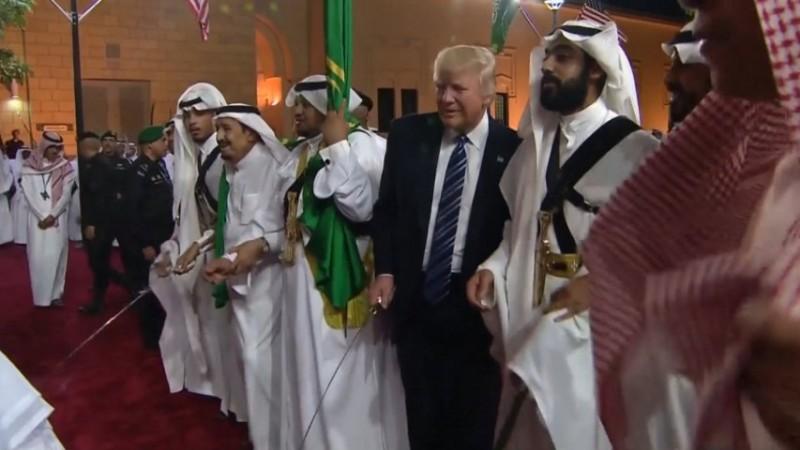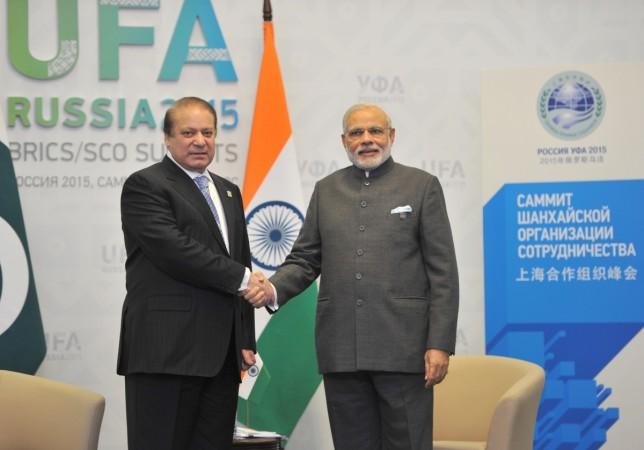
US President Donald Trump's first-ever foreign visit has shown him to be a clueless leader whose ignorance can do the world more harm than good.
Trump made it clear during his speech in Riyadh that Washington is committed to the Sunni Arab states and reversed the policy of his predecessor Barack Obama to get closer to Iran, a country which the Trump Administration believes has "fuelled the fires of sectarian conflict and terror" though reports suggested that it has secretly agreed that the nuclear deal with Iran was working.
Trump ignored a moderate's victory in Iran
This very stance of Trump to isolate Iran where a moderate Hassan Rouhani won the national election a day before by a landslide margin shows that the current American president has no vision to promote peace in the war-torn West Asia even if he urged a common fight against terrorism. Trump himself was widening the divide in the Arab world through his call for peace. An irony.
Getting ready for my big foreign trip. Will be strongly protecting American interests - that's what I like to do!
— Donald J. Trump (@realDonaldTrump) May 19, 2017
Trump's black-and-white vision to give peace a chance in West Asia means nothing less than playing with fire. In the complex region where interests cross each other more often, the US president's going back to the traditional policy of picking friends and backing regimes even if they have poor human rights records sends a sinister message.
Trump spoke in favour of peace but was dividing West Asia more
More than the religious, the Shia-Sunni divide's significance is political and geostrategic and if the world's only superpower chooses to keep the flames of rivalry alive, peace will never get a chance to defeat terror and conflicts. Trump has one-sidedly blasted Iran saying it has destabilised the region by stoking fire in other countries but has remained silent on ally Saudi Arabia bombing Yemen back to the stone age.
Great to be in Riyadh, Saudi Arabia. Looking forward to the afternoon and evening ahead. #POTUSAbroad pic.twitter.com/JJOra0KfyR
— Donald J. Trump (@realDonaldTrump) May 20, 2017
Moreover, while the US is supporting Iran-backed fighters in Iraq against the Islamic State militants, it is up against the same country in Yemen for backing Shia insurgents. These instances say that the current situation in West Asia is far too complicated for Trump to comprehend.
India is likely to see things challenging under Trump because of his 'either-or' takes
The naive president in Trump also is a matter of concern for India. Though the president has intended to play any role in the India-Pakistan issue and also expressed pleasure over his meeting with Pakistani Prime Minister Nawaz Sharif, New Delhi will understand clearly by now that the man is not reliable enough to come up with foolproof visions.

Much depends on how Trump tackles Afghanistan problem
Take for example, Afghanistan. Saudi Arabia, an ally of the US, is on the sides of both conflicting sides in the South Asian country. While its rich sheiks have privately financed the Taliban, backed by Pakistan, also one of its close allies, it has also officially backed the Americans and Afghan leadership to pursue peace.
India's foreign policy concerns are no less involved with Afghanistan but if the US ignores such motives from one of its close allies in international politics, then it is quite challenging for Prime Minister Narendra Modi to deal with Pakistan from the Afghan perspective.
India is trying to get closer to Iran for strategic reasons
With regard to Iran also, Trump's aggression doesn't augur well for India. New Delhi has a good relation with Tehran and has tried to make it even closer to counter the challenges from Pakistan and China – both in geopolitical and strategic terms. A year ago, Modi had embarked on a tour of Afghanistan and Iran to strengthen India's influence in these two countries in a pursuit to corner Pakistan and compete with China.
During the prime minister's visit, India pledged $500 million to develop Iran's strategic Chabahar Port to balance the Gwadar Port developed in Pakistan by China. The three countries also signed a tripartite deal to change the Chabahar Port into a transit hub bypassing Pakistan. If New Delhi wants to reap benefits of these strategic moves in the long run, then it has to win a steady friend in Iran. Trump's viewpoints stand contradictory to that.
Just like his oversimplified and flawed take on war against terrorism which overlooks the micro realities, Trump's US is also susceptible to misreading the China challenge in South Asia and how Washington can deal with India and Pakistan, two countries with completely contradictory terms with Beijing, without creating a mess in an already volatile region. Obama was decided on this issue: back India to corner China.
We don't yet know yet which way Trump is heading.









